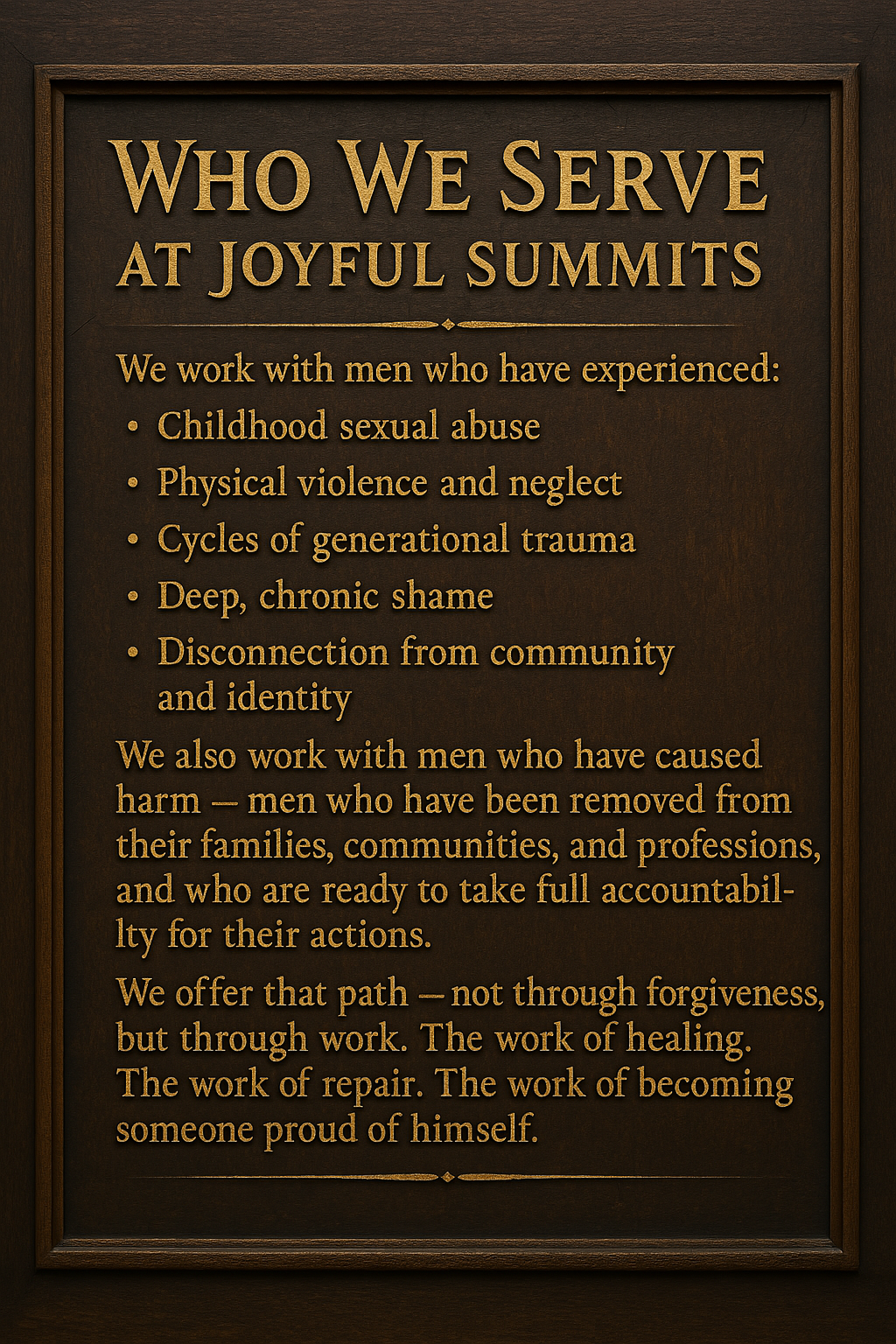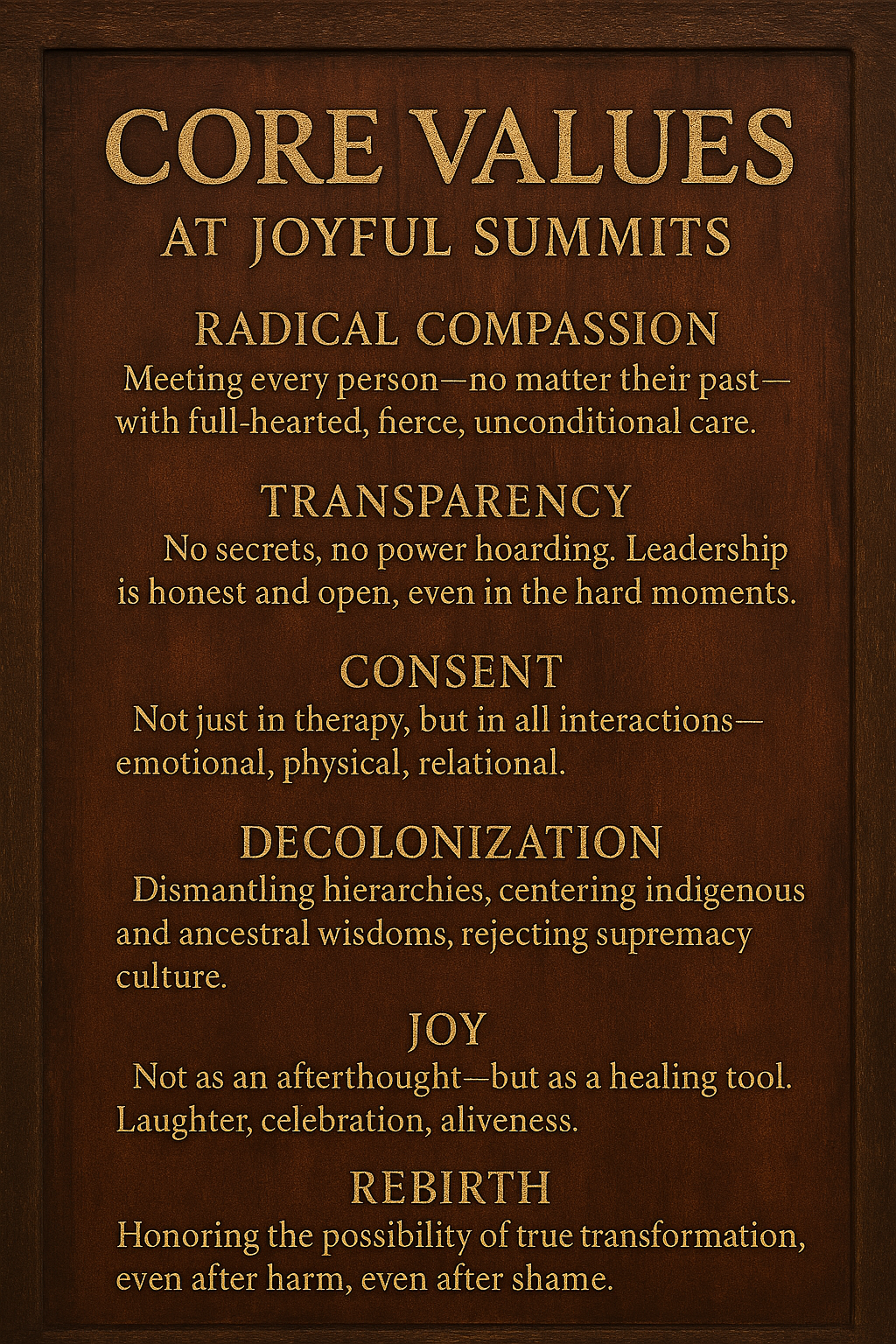
The Joyful Summits Restorative Justice Center is structured around a model called The Forge — a deliberate, intensive process of transformation through heat, pressure, and skilled guidance.

This residential program is designed as a 6-month intensive experience specifically for adult men who have experienced trauma and, in most cases, caused harm in their families or communities. We serve those who are often overlooked by traditional treatment — men who need both deep clinical healing and meaningful pathways to reintegration.
Healing
Integration
community
Education
Healing Integration community Education

Like steel in a blacksmith’s fire, each participant enters raw and shaped by past trauma, and emerges stronger, sharper, and more aligned.
Our model includes vocational education, community accountability, and evidence-based therapy in a highly structured, relational setting.
Program Rationale
-
Joyful Summits offers an extended duration of care and housing, rather than a brief intervention. This sustained engagement allows men to stabilize and progress gradually, addressing deeply rooted issues that cannot be resolved in a few weeks or months.
Research suggests that long-term support is critical for successful reentry: programs like Nevada’s Hope for Prisoners partner mentors with ex-offenders for ongoing guidance during reintegration. Continuous support helps navigate housing, employment and relapse challenges that often arise well after release. By providing long term care and then connecting our clients with a continuum of care after discharge, Joyful Summits fills a known gap – most reentry services taper off too soon, even though individuals remain vulnerable to relapse for years without a stable support system. The long-term residential model ensures accountability and assistance are maintained during the crucial period when recidivism typically occurs (within the first 3 years post-release) . This approach aligns with best practices that recommend “aftercare” and extended support to solidify treatment gains and prevent participants from sliding back into old patterns.
-
All programming at Joyful Summits is trauma-informed, recognizing that participants’ past victimization is central to their healing.
This includes individual and group therapy modalities designed for complex trauma, delivered by clinicians trained in trauma-focused cognitive behavioral therapy, EMDR, Internal Family Systems (IFS), Sex Addiction Therapy and similar evidence-based treatments. The rationale is clear: untreated trauma dramatically increases the risk of reoffending, whereas addressing trauma can disrupt that cycle. In fact, trauma-informed care is shown to “improve offenders’ life experiences and cease the cycle of offending” by helping individuals process trauma triggers instead of reacting with criminal or self-destructive behavior. Joyful Summits’ therapeutic model will help men develop healthy coping skills, emotional regulation, and resilience, which evidence shows can reduce substance abuse, impulsivity, and hostility – factors linked to criminal conduct.
Additionally, emerging research on specialized trauma interventions for incarcerated men has found significant improvements in mental health, anxiety, and anger management when trauma is addressed head-on. By making trauma recovery a centerpiece, Joyful Summits directly targets a root cause that standard correctional programs often overlook, thereby aligning with modern best practices in corrections therapy .
-
Joyful Summits emphasizes personal accountability within a supportive community.
This involves regular accountability check-ins, peer mentorship, and adapting models like restorative justice circles or Circles of Support and Accountability (CoSA) in the program’s context. The evidence behind such accountability-based support is compelling. CoSA, for instance, pairs former offenders with community volunteers in a structured support/accountability circle and has achieved dramatic reductions in recidivism – a Canadian study reported a 70% reduction in sexual recidivism and 35% reduction in overall reoffending among high-risk offenders who had a circle of support. A national replication found even greater effects (up to 71–83% reduction in reoffending) with sustained accountability and support . While
Joyful Summits serves a broader population, the principle is the same: combining compassion with accountability yields better outcomes. Participants will be guided to take responsibility for their actions (past and future) in a constructive way, supported by staff and peers who challenge destructive behaviors while modeling healthy relationships. This component draws on evidence that pro-social support networks and clear accountability significantly aid rehabilitation. Rather than punitive monitoring, Joyful Summits’ accountability model is restorative – helping men internalize positive values and answer to their community and themselves. This approach fosters public safety and trust, as participants demonstrate change through consistent, accountable behavior.
-
A distinctive element of Joyful Summits is its focus on vocational skill-building as part of recovery.
Participants will engage in trade education choosing a trade between tile installation, carpentry, and metal working. Clients will learn top tier education in their field from experienced tradesmen holding certifications in their field. This practical focus addresses one of the biggest predictors of reoffending: lack of stable employment.
Studies confirm that unemployment among formerly incarcerated individuals (around 27%) is five times higher than in the general population , and joblessness greatly elevates the risk of returning to crime. Conversely, equipping individuals with job skills and the opportunity to start their own business by building those skills has a well-documented positive impact. Prison education and vocational programs can reduce the odds of re-incarceration by 43% compared to those with no educational programming. Similarly, one analysis found vocational training participation cut recidivism to approximately 30%, much lower than typical rates. By teaching trades, Joyful Summits not only improves each man’s employability but also builds self-efficacy and routine – key factors in successful reentry. Gaining a legitimate livelihood provides an alternative identity to that of “ex-offender,” which is crucial for sustained desistance.
Additionally, the structured nature of learning a trade complements therapeutic goals: hands-on work can be therapeutic, giving participants a sense of accomplishment and future orientation. Clinicians attend client workshops with their trade to loop back what’s coming up into sessions via metaphor. Joyful Summits will partner with local businesses and trade schools to provide apprenticeships, certifications, and job placements, ensuring that graduates leave with marketable skills and employment prospects. This evidence-based emphasis on economic self-sufficiency directly contributes to lower recidivism and has broad community benefits, turning men who were once seen as liabilities into productive contributors to society.
-
Graduates of Joyful Summits will have significantly lower reoffense rates than comparable individuals who do not receive such services.
Our goal is to cut recidivism by at least half relative to state averages. For example, whereas Utah’s three-year recidivism rate is ~46% , Joyful Summits will target a recidivism rate below 25% for its participants (measured as re-conviction or re-incarceration within 3 years of program completion). This expectation is grounded in evidence that intensive, holistic programs can dramatically reduce reoffending.
Supportive accountability models like CoSA have achieved reductions in overall recidivism of 35–71% in controlled studies . Likewise, comprehensive reentry programs consistently show better outcomes than the norm – for instance, participants in a rigorous reentry pilot had far lower return-to-prison rates (23%) than a control group (38%) .
By addressing trauma, providing long-term support, and improving life prospects, Joyful Summits anticipates a meaningful drop in new offenses among those served. Success will be tracked via comprehensive outcome tracking throughout the program, after discharge, and by monitoring criminal justice data (rearrest, violation, and reincarceration rates) for alumni up to 3 and 5 years post-program.
Research suggests that long-term support is critical for successful reentry: programs like Nevada’s Hope for Prisoners partner mentors with ex-offenders for ongoing guidance during reintegration. Continuous support helps navigate housing, employment and relapse challenges that often arise well after release. By providing long term care and then connecting our clients with a continuum of care after discharge, Joyful Summits fills a known gap – most reentry services taper off too soon, even though individuals remain vulnerable to relapse for years without a stable support system. The long-term residential model ensures accountability and assistance are maintained during the crucial period when recidivism typically occurs (within the first 3 years post-release) .
This approach aligns with best practices that recommend “aftercare” and extended support to solidify treatment gains and prevent participants from sliding back into old patterns.
-
A critical impact goal is for participants to secure sustainable employment and income, paving the way for self-sufficiency.
By program completion, at least 70% of Joyful Summits participants will obtain gainful employment, trade certifications, or enroll in continuing education. Within one year post-release, we aim for that figure to exceed 80% in either employment or vocational training.
This target is supported by evidence from similar initiatives: in a trauma-informed reentry program (RISE), over 80% of participants were employed eight months after release – a striking outcome given that the typical unemployment rate for ex-offenders is around 27% . Joyful Summits will track job placement rates, number of trade certificates earned, and socioeconomic status of alumni.
We anticipate that participants, having learned in-demand trades (e.g. tile installation, carpentry, or metal working), will not only find jobs but often at living wages. Achieving financial stability is a key protective factor against reoffending, as it addresses economic motives for crime and builds self-esteem. The program’s success will be evident when graduates are consistently able to support themselves and perhaps their families through honest work – transforming them from economically vulnerable to economically secure.
Long-term metrics may include job retention at 12 and 24 months and any increases in socioeconomic status. Research clearly links education and employment to recidivism reduction; even a basic prison education program can cut the likelihood of re-incarceration by 43%, so the comprehensive vocational training at Joyful Summits is expected to yield substantial public-safety dividends alongside individual success.
-
Participants will demonstrate measurable improvements in psychological well-being and a reduction in trauma-related symptoms.
Joyful Summits will use pre- and post-assessments (such as PTSD checklists, depression/anxiety scales, and trauma symptom inventories) to track progress. The goal is that the majority of participants show clinically significant reductions in PTSD symptoms, anxiety, and depression after engaging in our trauma-informed therapies. We’ll also be incorporating a measurement tool to analyze a client’s interpersonal feelings toward their “exile” part.
Achieving this is realistic – a randomized study of a trauma-specific intervention for incarcerated men found significant improvements on 11 of 13 trauma-related outcomes (including mental health functioning and anger management) for the treatment group.
We expect participants to report healthier coping strategies, fewer trauma triggers leading to crisis, and an increased sense of hope and self-worth. Qualitatively, men will move from a “survival” mindset dominated by past trauma toward a stability and growth mindset. These mental health gains are not only important for personal healing but are also predictors of reduced recidivism; as research notes, untreated PTSD and trauma can perpetuate the cycle of offending, while successful trauma treatment can help “cease the cycle of offending”. Outcome metrics will include the percentage of participants with reduced trauma scores and testimonial evidence of improved emotional regulation and relationships.
-
Joyful Summits will ensure that participants transition into stable living situations and pro-social community roles.
Clients will be placed with transitional housing, a clinician, and an apprenticeship in their trade upon return home. One outcome goal is 100% of program graduates obtaining stable housing upon reentry – whether through halfway houses, supportive housing, or reunification with family when appropriate. Housing stability will be tracked at 6 months, 12 months, 3 years, and 5 years after program exit.
Additionally, we aim for participants to develop at least one positive social support connection (mentor, support group, or community organization) they can rely on after graduation. These goals address the often-overlooked social determinants: homelessness and social isolation are significant risk factors for relapse into crime. By contrast, those in programs like RISE who received continued support were less likely to experience homelessness after release.
Joyful Summits intends to replicate such outcomes; our staff will assist each man in securing housing and integrating into community support networks (such as faith groups, recovery communities, transitional living, group homes, or peer alumni groups). Success in this domain will be measured by housing status and engagement in community or alumni activities. We expect that participants who complete the program will not be living on the streets or in unstable environments – a stark improvement given that, without support, many formerly incarcerated men do become transient or disconnected.
Ultimately, full community reintegration is the capstone outcome: graduates living as productive, law-abiding community members. We will collect data on civic indicators such as involvement in volunteer work, positive family reunification, and compliance with any supervision requirements as additional evidence of healthy reintegration.
Outcomes & Impact Goals

The Joyful Summits is committed to achieving measurable, life-changing outcomes for its participants.
By providing long-term, trauma-informed, accountable, and skills-focused care, Joyful Summits reflects an integrated, research-informed approach.

Joyful summits
Joyful summits
Joyful Summits will produce a profound impact not only for the men it serves, but for their families and the broader community.





QUESTIONS? LET’S CHAT.
HAVE QUESTIONS OR JUST WANT TO CHAT? BOOK A FREE CONSULTATION.





